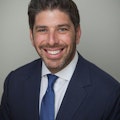Conceptualizing and growing a dental management service organization
From my first experience with exodontia in dental school, it was clear to me that oral and maxillofacial surgery was for me. Over the 25 years since I began my formal training, a great deal has changed, but from day one, I fell in love with the work and set out to become the best OMS I could be. Like many others, I started as a loyal associate, and eventually, I took the risk (and the loans) to become a single-practice owner. As local opportunities arose, I brought on associates and partners, and using commercial lenders and my own financial resources, we acquired practices throughout New Jersey. I built a brand and a practice, both of which I could not have been prouder.
Driven by my own curiosity and entrepreneurial spirit while observing the increasing and evolving interest in OMS practices in the post-COVID world, I set out to learn as much as I could about large-scale health care from trusted peers. The perceived consensus was clear: large-scale health care across all specialties, including oral surgery, was thought to fall short in delivering quality care.
There was and continues to be a prevailing belief that financial and corporate pressures often compromise patient care and damage reputations. Drawing from my experience in privately acquiring and building multiple practices, I identified an opportunity to challenge these norms and lead a health-care transformation alongside like-minded surgeons who share my vision. It became clear that to continue expanding and practicing on my terms at scale, I needed partners who could appreciate and support a platform designed specifically for this specialty.
Shortly after this realization, I set out to find investors who believed enough in what I was doing that they would support the concept of a truly surgeon-led platform by writing into the charter of the organization the existence of a largely autonomous and independent clinical advisory board made up of surgeons from diverse brands within the platform who would oversee and advise on all matters related to delivery of care. Once I vetted and found the right financial partners, MAX Surgical Specialty Management was born.
We all understand why private equity and other outside investors have become interested in oral surgery and other dental specialties: significant profitability and relative protection in down markets to name a couple, but for us, the clinicians, there are innumerable benefits to this evolution in the business of how we practice. I will highlight a few below, but there are many more to consider as well.
Leading expertise: A collaborative network
Becoming part of a management service organization (MSO) that focuses on preserving, developing, and supporting clinical autonomy and continuous reinvestment in education, technology, and collaboration will almost certainly provide direct access to a community of highly differentiated and skilled peers who might otherwise be viewed as competitors. Sharing knowledge and continuous learning within the network can ensure doctors stay updated with the latest advancements in technique and materials and can cultivate a culture and environment that encourages innovation, expands the scope of offerings, and pushes the boundaries of each individual and the collective, clinical practice.
Latest and greatest: Advanced technology and innovation
In larger-scale platforms that are fiscally responsible and forward-
thinking, there is often the financial wherewithal to make a significant investment in technology that could otherwise be too much of a burden on the individual or young practice owner who may already be servicing considerable debt. These investments could yield a significant improvement in patient care and resultant patient outcomes and exponential goodwill.
Support system: Focus on what matters
From the perspective of our partners and through our extensive interactions over the years, a significant advantage of joining an MSO lies in the comprehensive support across administrative, financial, human resource, and marketing functions. As clinicians, we’ve been trained and are well equipped to treat patients and perform procedures, and the aforementioned aspect of an MSO allows us to focus on what matters: pursuing our passion by delivering exceptional patient care without the concerns associated with managing aspects of the business that may otherwise be overwhelming or out of our comfort zone. However, when considering partnering with any organization, it’s best to understand the nonclinical opportunities for engagement. Many of us have passions or aptitudes outside of patient care where we can contribute, and we should.
Exceptional reputation: Stand out in the field
Being part of a larger, reputable, and well-established group often provides immediate credibility and, in many cases, the prestige that can be crucial for dentists looking to develop a following for themselves in the field. In dentistry, as in all business, reputation is paramount to sustained success—it shapes perception and underscores the quality of patient care to be expected. Building a strong name and brand can take years, but affiliating with an existing group can almost immediately catapult a young practitioner into a place of credibility.
Moreover, in today’s digital age, where online reviews can significantly impact careers, the power in numbers can be strong. This factor drives home the concept of finding the right group to join. When considering joining forces or associating with any organization, the learning from due diligence done of the organizational reputation will be far more important as is relates to your day-to-day well-being and professional satisfaction than the financial piece.
In summary, my personal journey thus far—from aspiring surgeon, through the development of Riverside Oral Surgery, and now, as co-CEO and founder of MAX Surgical Specialty Management—has been an incredible personal and professional evolution. Marked by countless wins and the occasional challenge, this path has reinforced my belief in the power of collaboration in health care. Along the way, my peers have become allies, many mentors are now peers, once competing practices are now partners, and together, we continue to challenge traditional norms to advance both our individual experiences and, hopefully, the delivery of patient care itself.
Not just embracing but fostering growth and change has allowed us to challenge ourselves and our preconceived notions of large-scale health-care platforms to significantly improve outcomes through shared ideas, complementary skill sets and interests, and an unwavering singular focus, redefining and elevating the optimal patient experience each and every time.
Editor's note: This article appeared in the September 2024 print edition of Dental Economics magazine. Dentists in North America are eligible for a complimentary print subscription. Sign up here.
About the Author

Jason M. Auerbach, DDS
Jason M. Auerbach, DDS, is a renowned oral and maxillofacial surgeon. He is known as an industry leader through his handle @bloodytoothguy (190K followers), where he educates rising dental stars. Dr. Auerbach founded Riverside Oral Surgery in 2007, which prides itself on providing the optimal patient experience. With 10 locations, this is the premier full-scope group in New Jersey and the Official Oral Surgeons of the New Jersey Devils. His newest venture, MAX Surgical Specialty Management, supports 28 locations in five states across the Northeast.


